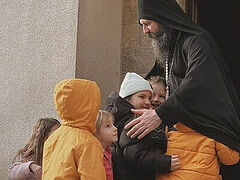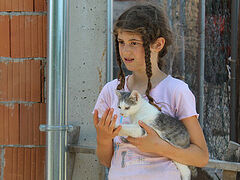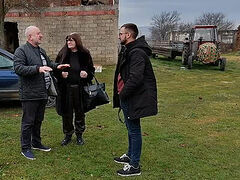“Have a good trip! Will you be so kind to bring me a chess set the next time you come? A deal?” This is what Nikola Stankovic told us when we parted the last time as we were leaving Slivova near Pristina. This is the place we return to once the opportunity presents itself.
It’s true that we come here often—to the suburb of the once glorious city of Pristina, once the intellectual, industrial, and cultural center of our Kosovo… People used to come here from everywhere, as the city attracted professors, engineers, writers, and artists. Before, Pristina was known for its flourishing cultural life, just as today it’s buzzing with commercial and shopping activity—full of intrusive and aggressive advertising by foreign companies, probably the only ones who benefit from the war. “Nuk ka me Pristine” (Albanian)—“Pristina is no more!” was the title of a novel published on the twentieth anniversary of the “March pogrom“ of Serbs. Serbs remember how yesterday’s neighbors, colleagues, and friends chased them out of their then Serbian city.
Things are no better in the suburbs of Pristina; they are completely cut off from the city. The nearby villages are dying out, standing isolated from the outside world and kept away from the blessings of civilization. Many Serbs were forced to leave or flee their homes. Many of them have died. Many of their houses were burned down… The tiny village of Slivova is a place where you can still hear people speak Serbian.
 A Serbian school for a single student
A Serbian school for a single student
“It used to be so wonderful here before the war! People worked in factories and in agriculture. Our village was bustling with life and there were a lot of children. I had more than twenty students in my class, and we are talking about a village school! But these days, after the war… Consider it a desert; everyone has moved or fled away,” Nikola's father tells us. He speaks of Serbs when he says “everyone,” as with every passing day, more and more Albanians settle into Slivova. For a long time now, the village is more than half Albanian. They come from the city in search of a quiet life and clean air, and they firmly settle here. I asked if there were any clashes. No, he replies, not yet, but who knows.
“Soon we’ll be left all alone. Our children have no future here”
Basically, why would they want clashes when Serbs are already on the move, leaving their homeland behind. “Soon we will be left all alone. Our children have no future here. My older sons, for example, have long been living and working elsewhere.”
Nikola, the third son and the only school student in Slivova, is in seventh grade. We ask our old friend how he is doing.
“I mind the goats and play chess. Sometimes I look after Dragan, my younger brother (there are four brothers in his family), but he doesn't always listen to me!”
 A young shepherd. A kind one We are walking with our seventh-grader to his school, now located in a house left behind by a Serb. Since 1999, Serbian children never returned to their classes in their old school. It is the result of the “optimization of Serbian education,” the Kosovar way. We “snatched” Nikola for a short while—pulling him away from his herd. His youngest brother Dragan worthily replaced his brother in the line of shepherd duty. We sat down with him on a bench nearby to play a game of chess, Nikola’s favorite pastime. He admitted, embarrassed, that he sometimes played chess with his teacher at his “new” school, as well. But once he entered high school grades, he played against the computer, his main rival. It is not much of a conversation partner, but at least it offers an interesting game of chess.
A young shepherd. A kind one We are walking with our seventh-grader to his school, now located in a house left behind by a Serb. Since 1999, Serbian children never returned to their classes in their old school. It is the result of the “optimization of Serbian education,” the Kosovar way. We “snatched” Nikola for a short while—pulling him away from his herd. His youngest brother Dragan worthily replaced his brother in the line of shepherd duty. We sat down with him on a bench nearby to play a game of chess, Nikola’s favorite pastime. He admitted, embarrassed, that he sometimes played chess with his teacher at his “new” school, as well. But once he entered high school grades, he played against the computer, his main rival. It is not much of a conversation partner, but at least it offers an interesting game of chess.
We met Nikola for the first time three years ago. He won’t make friends with you lightly, or for no reason at all; it took him a while to grow accustomed to us. Village folk are like that. But once they get to know you, you can’t find a better friend. It was the same this time. When he saw us, he didn't say much, but his eyes shone with such joy that no words were necessary. And he is always trying to give us gifts.
“I recently went to a soccer game in Gracanica; my dad took me there. It was really great! Teachers come to the village every day, well, to teach me. So, I'm learning. What else can I do?”
 Nikola Nikola is one of our “trailblazers”. He took part in the summer school camp organized last year for Serbian children from Kosovo and Metohija by our charity organization called “Kosovo Pomoravlje.” Everything went well, but, as we have noticed, these children couldn’t get enough of playing soccer with their peers from other ghettos. For them, soccer is an important thing, a way to interact, no matter how you cut it. We asked him if he’s going to attend our summer school this year.
Nikola Nikola is one of our “trailblazers”. He took part in the summer school camp organized last year for Serbian children from Kosovo and Metohija by our charity organization called “Kosovo Pomoravlje.” Everything went well, but, as we have noticed, these children couldn’t get enough of playing soccer with their peers from other ghettos. For them, soccer is an important thing, a way to interact, no matter how you cut it. We asked him if he’s going to attend our summer school this year.
“I sure will! Only if you have more soccer time!”
We finish the chess game and say our goodbyes. We leave Nikola with his herd, kings and queens, and a chessboard under his armpit. We already know what we’ll bring him when, God willing, we come here next time: soccer cleats and a football. We wave and honk… and hope that we will be able to bring together the boys and girls from the enclaves of Kosovo and Metohija in our summer school. And yes, they’ll have more soccer time there—we’ve learned our lesson well.




